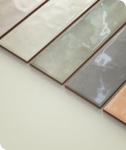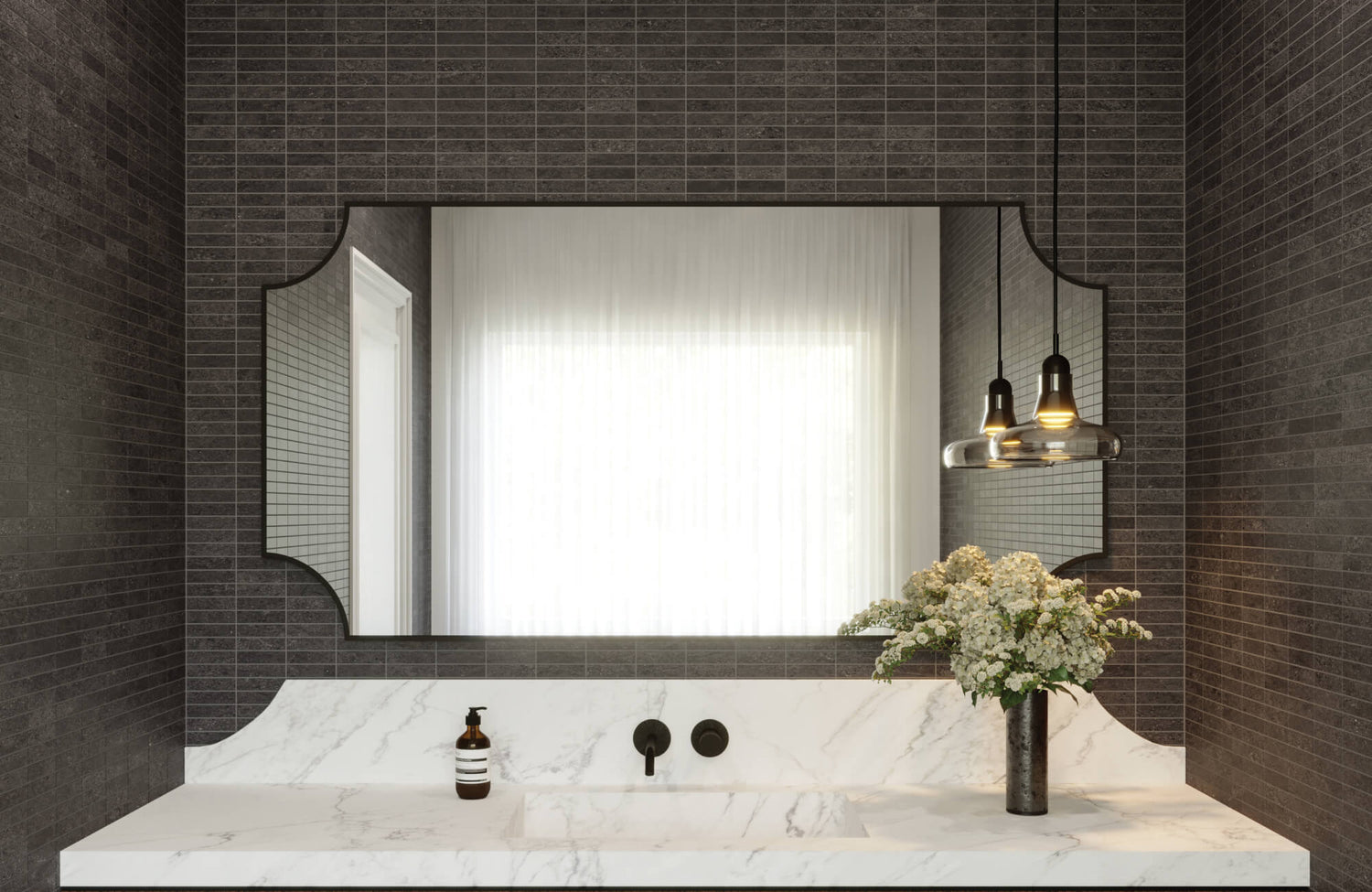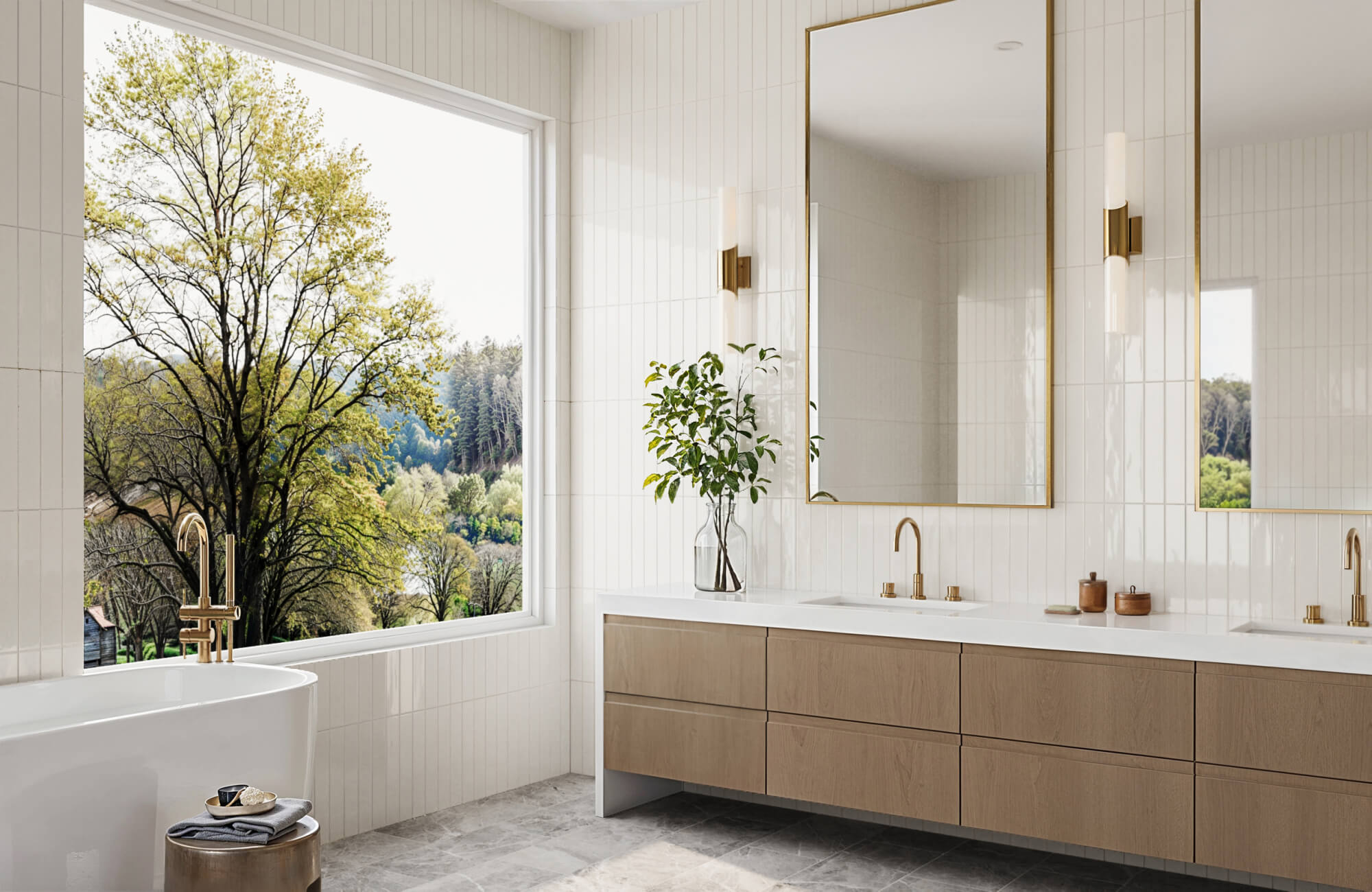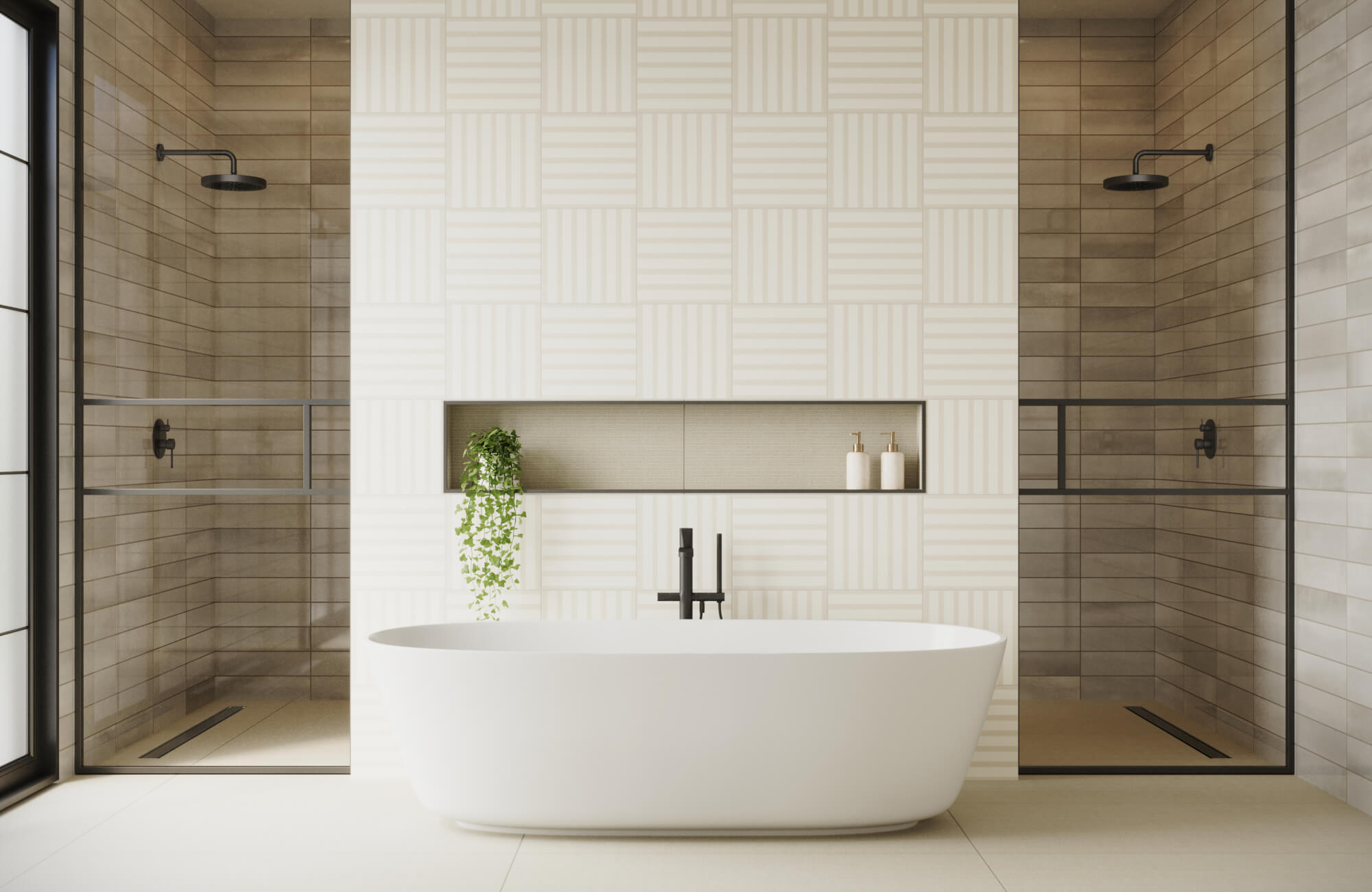Selecting the right tile materials for bathroom walls and floors can enhance both their functionality and style. Porcelain stands out as a top choice for its many advantages.
Porcelain tiles also seamlessly combine visual versatility with practical durability, making them ideal for bathrooms. It can mimic materials like marble and wood while resisting water damage, stains, and discoloration. This balance of elegance and performance ensures that porcelain tiles enhance both the appearance and longevity of any bathroom design.

Low Maintenance and Moisture Resistance
Porcelain tiles are a versatile and practical choice for bathrooms, combining style with exceptional durability.
Low Maintenance
One of porcelain’s standout features is its ability to remain clean and fresh-looking with very little effort. Its smooth and non-porous surface naturally resists dirt and grime, making it easy to maintain on a day-to-day basis. Simple cleaning methods, such as wiping with a damp cloth or mopping with warm water, are often sufficient to remove dust, stains, or spills. For example, a tile like the Tatum 24x48 Matte Porcelain Tile in Cross-Cut Sand, shown in the photo above, offers both practicality and style, making routine maintenance a breeze.
For deeper cleaning, porcelain is highly compatible with a wide range of cleaning products without the risk of damage or discoloration. Even stubborn stains can be removed with basic solutions like water mixed with white vinegar or a mild detergent. However, it is always a good idea to check the manufacturer’s guidelines or test cleaning products on a small, inconspicuous area to ensure compatibility with your specific porcelain tile finish. Unlike other materials that may require periodic sealing, polishing, or refinishing, porcelain retains its beauty without additional treatments, saving both time and money over the long term.
Moisture Resistance
Porcelain’s exceptional moisture resistance is one of the primary reasons it excels in bathroom applications. Unlike porous materials like natural stone or wood, porcelain does not absorb water, even in the dampest conditions. This inherent nonabsorbent quality ensures that porcelain remains free of swelling, warping, or discoloration, which are common issues in wet environments. It provides peace of mind, knowing that porcelain tiles will maintain their integrity and appearance even in bathrooms with heavy use.
This moisture resistance also contributes to porcelain’s long-term durability. By preventing water penetration, porcelain reduces the risk of mold, mildew, and bacteria growth, which can thrive in damp spaces. This makes porcelain not only a practical choice for functionality but also a hygienic option for maintaining a clean and healthy bathroom environment.
Whether used on floors, walls, or shower enclosures, porcelain’s ability to resist moisture damage ensures that it can withstand the test of time. Homeowners can trust this material to remain beautiful and reliable, regardless of how much water exposure the bathroom endures.

Diverse Applications
Porcelain tiles are a versatile and durable option for both bathroom and kitchen floors and walls, offering a practical and stylish solution for any design. Whether used as a sturdy flooring material or an elegant wall covering, porcelain tiles deliver outstanding performance in wet and humid environments. With their wide range of designs, finishes, and patterns, they are adaptable to any bathroom aesthetic.
Bathroom Floors
Porcelain tiles are a smart investment for bathroom floors, offering exceptional durability and long-lasting performance. Their dense and tough composition allows them to withstand frequent use and everyday wear without showing signs of damage. Whether you're designing for a master bath or a guest bathroom, porcelain ensures a reliable flooring solution that stands up to the demands of daily use.
In addition to their functionality, porcelain tiles offer endless design possibilities for bathroom floors. From sleek, modern looks to patterns that mimic wood or stone, porcelain tiles can complement any design style while maintaining their resilience. Their ease of maintenance makes them ideal for busy households, as they resist dirt and grime buildup and are simple to clean with basic solutions.
Bathroom Walls
With options ranging from marble-inspired veining to bold, colorful patterns, porcelain can transform walls into statement features or provide a sleek, minimalist backdrop. Large format porcelain tiles, such as the Leona 24x24 Matte Porcelain Tile in Marfil, shown in the photo above, are particularly popular for bathroom walls, creating a seamless look with minimal grout lines that enhance the overall elegance of the space.
Beyond their visual appeal, porcelain tiles are highly practical for bathroom walls due to their water resistance, as they act as a protective barrier against moisture, preventing issues like mold and mildew that can arise in damp environments. Easy to clean and highly durable, porcelain bathroom wall tiles are an investment that combines beauty with long-term performance, ensuring your space stays stunning and functional for years to come.

Design Versatility and Luxe Options
Bathroom porcelain tiles offer unparalleled design flexibility, making them an ideal choice for a wide range of aesthetics. Whether the goal is to achieve a luxurious spa-like ambiance or a warm, natural aesthetic, these tiles deliver elegance and resilience.
Large Format Porcelain Tiles for Luxe Appeal
Large format porcelain tiles, often referred to as slabs, bring an undeniable sense of luxury and sophistication to bathroom designs. These oversized tiles are available in a variety of finishes and patterns, ranging from marble-inspired textures to sleek, modern surfaces. Their expansive size enhances the visual appeal of any space, creating a clean and seamless look that elevates bathroom aesthetics.
One of the standout benefits of large format bathroom tiles is the minimal appearance of grout lines. Fewer grout lines not only contribute to a more elegant and uninterrupted design but also make cleaning easier by reducing the areas where dirt and grime can accumulate. For a bold statement, large porcelain slabs can be used from floor to ceiling, creating a dramatic and cohesive finish that exudes modern sophistication.
If you're curious about how bathroom tiles would look, you can use our innovative augmented reality (AR) technology to visualize them in your space. This tool allows you to see how the tiles you’ve chosen will transform your bathroom, helping you make confident design decisions.
Wood Look Porcelain Tiles
Wood look porcelain tiles offer the perfect blend of natural warmth and practicality, making them a popular choice for bathroom designs. These tiles mimic the appearance of genuine wood with impressive realism, showcasing intricate grain patterns and warm tones that bring a cozy, organic feel to the space. Options like the Preston 8x48 Matte Porcelain Tile in Pine, displayed in the photo above, provide an excellent combination of style and durability for creating a natural yet functional bathroom aesthetic.
Unlike real wood, which can warp, stain, or deteriorate in wet environments, wood look bathroom tiles crafted from porcelain are nonabsorbent and highly durable. This makes it particularly well-suited for bathrooms, where moisture exposure is constant. With its ability to withstand humidity, spills, and daily wear, wood look porcelain delivers the timeless charm of wood without the maintenance concerns.
Whether used on floors, walls, or even in shower enclosures, wood look bathroom porcelain tiles provide a versatile option that seamlessly combines natural beauty with the performance of porcelain. This design choice allows homeowners to enjoy the best of both worlds, the aesthetic appeal of wood and the long-lasting durability of porcelain.

Cost-Effective Alternative to Marble
Marble has long been a symbol of luxury and sophistication, admired for its unique veining and natural beauty. Its timeless appeal makes it a popular choice for bathrooms, adding an elegant, high-end aesthetic. However, marble’s beauty comes with significant maintenance requirements and costs. As a porous stone, it is prone to staining, water absorption, and etching from acidic substances, requiring regular sealing and specialized care to preserve its appearance. Additionally, marble is more susceptible to chipping and scratching, making it less ideal for high-moisture or heavy-use areas.
For homeowners seeking the luxurious look of marble without its high cost and upkeep, porcelain offers an excellent alternative. Typically priced between $3 and $30 per square foot—compared to marble’s $10 to $40 per square foot—porcelain provides a more budget-friendly solution without sacrificing style or durability. It is highly resistant to water, stains, and scratches, eliminating the need for frequent sealing or intensive maintenance. Over time, the durability and low maintenance of porcelain lead to significant cost savings, making it a practical choice for busy households.
Beyond affordability, porcelain tiles are designed to mimic the elegance of marble with remarkable accuracy. Options like the Aniston 24x48 Matte Porcelain Tile in Calacatta Quarzite, depicted in the photo above, replicate the soft veining and refined look of marble while offering superior durability. With a variety of finishes and patterns available, porcelain allows homeowners to achieve a sophisticated, high-end bathroom design without the challenges of maintaining natural stone. Its combination of beauty, resilience, and cost efficiency makes it the ideal alternative for those who want the elegance of marble with the practicality of a long-lasting, low-maintenance material.
Porcelain as the Ultimate Bathroom Material
Porcelain tiles combine style, durability, and practicality, making them the ultimate choice for bathroom design. With their ability to resist moisture, stains, and wear, porcelain ensures a long-lasting and low-maintenance surface that stands up to the demands of daily use.
Beyond functionality, porcelain offers incredible design versatility. From marble-inspired patterns to wood look textures and large format slabs, it provides endless options to create bathrooms that are elegant, modern, or timeless. Its affordability compared to natural materials like marble also makes it an attractive choice for homeowners seeking luxury on a budget.
If you're ready to explore how porcelain can elevate your bathroom, you can get tile samples to find the perfect match for your space. Seeing and feeling the tiles firsthand will help you make an informed decision that suits your design and functional needs.
Frequently Asked Questions (FAQs)
If you're considering porcelain tiles for your bathroom, you may have a few questions about their features, uses, and benefits. Below, we’ve answered some common questions that readers might have when exploring porcelain as a bathroom material.
1. Can porcelain tiles be used for areas other than the bathroom?
Yes, porcelain tiles are versatile and can be used in many areas of the home, including kitchens, living rooms, and outdoor spaces. Their durability, water resistance, and ability to mimic other materials make them suitable for a variety of applications. Whether it's a busy floor or an elegant backsplash, porcelain is an excellent option for almost any surface.
2. How do porcelain tiles compare to ceramic tiles?
Porcelain tiles are a type of ceramic tile, but they are denser, less porous, and more durable than standard ceramic tiles. This makes them better suited for moisture-prone areas like bathrooms. Additionally, porcelain tiles are more resistant to scratches and stains, making them a longer-lasting choice for both floors and walls.
3. Do porcelain tiles get slippery when wet?
Porcelain tiles are available in a range of finishes, including matte, textured, and slip-resistant options, which are specifically designed for wet environments like bathrooms. To minimize the risk of slipping, consider choosing tiles with a slip-resistant surface, especially for bathroom floors or shower areas.
4. How long do bathroom porcelain tiles typically last?
Bathroom porcelain tiles are highly durable and can last for decades when properly installed and maintained. Unlike some materials that may wear down or require frequent replacement, porcelain tiles are resistant to scratches, chips, and water damage, making them a long-term investment for bathrooms and other spaces.
5. Are porcelain bathroom tiles environmentally friendly?
Porcelain bathroom tiles are considered an eco-friendly option because they are made from natural materials like clay and sand, and their durability reduces the need for frequent replacement. Additionally, many manufacturers now produce porcelain tiles using sustainable practices, such as recycling water and materials during the production process.








